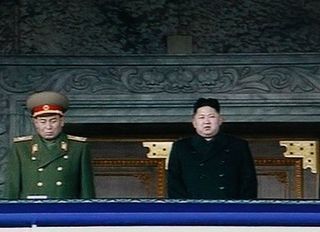Truth, Kim Jong-il and Prince Philip
Truth, as everyone knows, is the first casualty of war. But it doesnt fare too well when monarchs and/or dictators die . . . or even, I suspect, when royals are taken into hospital.
For a start, the authorities never want to announce the death until they have got the transmission of power sorted. So when exactly Kim Jong-il finally fell off his perch, I suspect we will never know -- but it could have been some time before we were all told (the intervening hours being spent in getting Kim Jong-un briefed, and his lines learnt -- and in dealing with any of the other relatives who might have made trouble).
And we can't be certain about where he died either. Do we believe the story that he was on a train, going on one of his hard-working visits to his people? Or do believe the South Korean spies who say that the train never left the station (and that the train story was invented to conceal a much more mundane, less public-service, death at home in bed)? Or do we think that the spies were simply trying to discredit the enemy, by alleging a lie about the death location . . . Bluff and double-bluff.
And this kind of thing isn't just a problem across the "axis of evil". Remember that in 1936 King George V's doctor famously gave him a fatal dose of morphine (somewhere between euthanasia and convenience killing). It was not only to relieve his suffering and give him a more dignified end, but also (as the doctor himself apparently admitted) to make sure that the death and succession happened early enough to be announced in the morning Times, not in the far less prestigious and proper evening papers.
I couldn't help having some of this in the back of my mind when I was reading about Prince Philip's recent stay in hospital.
Happily, he now seems to be on the mend (even the most committed anti-royalist could hardly wish the old man dead). But some of the press releases sniffed of a bit of a cover-up to me. Why did almost all the royal family rush over to see him? Last time he was in hospital, it is said that none of them visited at all. So were they simply rushing over to take him his Christmas presents, before getting on with the business as usual celebrations at Sandringham? Or did they think that they had better go and say goodbye this time?
And what about the Queen being "briefed" about his progress? Maybe, I thought, that's how the royals do illness. She doesn't talk to him on the phone, she is "briefed"? But maybe, I reflected cynically, he's actually too ill to chat to the wife.
Anyway, the good news is that my suspicions were not quite on the button this time. But rest assured, when the final moment does come, the bulletins aren't going to be any different from what we've just had. They'd still be talking about how he wanted to be leading the Boxing Day shoot, even if he was in a coma.
And you know, of course, where this post is going to end. Yes, it was much like this in ancient Rome too. My favourite example comes from Livy's account of the death of King Tarquin the Elder (the fifth king of Rome): he was murdered, but his wife carefully covered up his death and pretended it was business as usual, until she had successfully ensured that power had passed to her son-in-law, Servius Tullius (Livy, 1, 39-41). Of course, Livy didnt have the foggiest clue about what had 'really' happened at the death of the semi-legendary Tarquin. But he knew how transmission of royal worked.
Come to think of it, the presentation today of Kim Jong-un to the soldiers and people doesn't look all that different from the launch (as Tacitus describes it, Annals 13, 1-4) of the new Emperor Nero in Rome in 54 AD.
Mary Beard's Blog
- Mary Beard's profile
- 4112 followers




